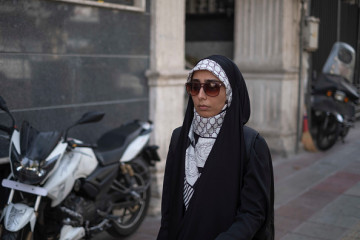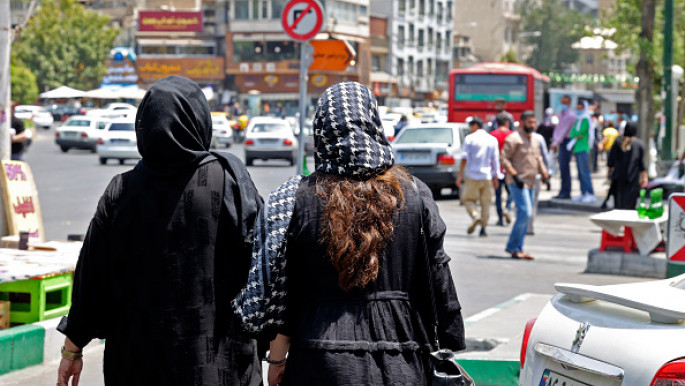

Controversy over the compulsory hijab law in Iran returned to centre stage, after a series of campaigns – some supporting the mandatory hijab policy and others fighting it.
Meanwhile, Iran's "morality police" are back in force on the country's streets, ready to confront those who refuse to comply and whose appearance is being described as "un-Islamic" according to Iran's authorities, who have also organised official media campaigns to undermine the anti-hijab protesters.
Iran's inaugural "Hijab and Chastity Day": Mixed reactions
Iranian women who reject the mandatory hijab policy responded to Iran's first Hijab and Chastity Day, held on 12 July 2022, by launching the "NoToHijab" campaign. Some filmed video clips of themselves removing their headscarves and posted these on Iranian social media networks as well as overseas channels affiliated with Iranian dissident groups.
However, Iranian women who support the hijab policy organised counter-demonstrations in support of the decision to hold the Hijab and Chastity day in several cities. Meanwhile, conservative Iranian media outlets expressed scepticism regarding the veracity of the videos posted of women removing the veil in Iran as part of the "NoToHijab" campaign.
A number of local officials have also made demands that women who don't adhere to the full Islamic veil shouldn't be allowed to continue to work in public institutions and should be prevented from using public services like the metro.
"Iranian women who reject the mandatory hijab policy responded to Iran's first "Hijab and Chastity Day", held on 12 July 2022, by launching the "NoToHijab" campaign. Some filmed video clips of themselves removing their headscarves and posted these on Iranian social media networks"
Women's right to choose
Azita lives in Tehran. She supports the "NoToHijab" campaign and says to Al-Araby Al-Jadeed, The New Arab's Arabic-language sister publication: "Women have the right to choose what they wear, and there must be freedom on this. I hate the idea of forcing anything on any person against their will. The campaign isn't calling for anyone to strip naked – just for removing the head covering."
She continues: "Why have the police patrols returned to the streets? Have they managed to solve all our problems then, apart from the way a woman veils herself? My mother wears the hijab and covers her head totally, but I want to live in my own way, and my convictions are different to hers."
Question of hijab hijacked by politics
As for Mariam, who lives on Keshavarz Boulevard in Tehran, she wears a full-length black chador but rejects what she views as the "politicisation of the hijab", believing that "the actions and the reactions over the subject of wearing hijab don’t serve Islam, and the matter has stopped having anything to do with religion – it has now become a matter governed predominantly by politics and the media".
|
|
She adds: "Certain channels abroad are encouraging Iranian women to remove the hijab as a way of showing opposition to the ruling regime, but they either don't realise or are ignoring, the fact that this is pitting people against each other."
She points to the fights which broke out recently between women wearing headscarves and those not wearing them in public places which were caught on video and posted on social media.
She puts the rising tensions down to the fact that the "veil has been removed from its original context, which is that it is a religious question, and is based on conviction and cannot be imposed by force – in the same way, it can't be removed by force, or with political and media campaigns."
Iran's hijab policy history
After the Islamic revolution in 1979, Iranian women were forced to wear the Islamic veil outside the house. Under Article 638 of the Iranian Penal Code, women who appear in public without the Islamic veil may be fined up to the equivalent of $20, be sentenced to ten days to two months in prison, or be flogged up to 74 times.
"The actions and the reactions over the subject of wearing the hijab don’t serve Islam, and the matter has stopped having anything to do with religion - it has now become a matter governed predominantly by politics and the media"
However, in practice, this law is not implemented against women who don't wear the Islamic veil (which entails full coverage of the head and body) but is implemented against those who break the regulations of wearing the customary veil, familiar in Iran, and which the authorities accept, which includes partial covering of the head and allows some of the hair to show.
Recently, videos have gone viral on social media showing cases of morality police violence against unveiled women. Among them was a video clip taken just weeks ago showing a distraught woman screaming at a patrol that her daughter was ill to try to stop them from arresting her. The video caused outrage on social media and subsequently, the police announced that the behaviour of the patrol in question had been against regulations and that the officer in charge of the unit responsible had been punished.
Video clips of arguments, which sometimes escalate into physical fights, between veiled and non-veiled women on buses and the metro have also circulated through online networks.
Roqiye says she supports hijab-wearing women who "promote virtue": "The veil is a religious and legal duty, and trying to remove it violates the law and should be challenged. The women involved in the "NoToHijab" campaign are linked to the enemies of religion and of the Islamic Republic, and they want to change the religious culture of the people and their Islamic convictions."
She defended the presence of the morality police squads on the streets in order to confront "un-Islamic appearances", but was keen that the mistakes sometimes made by these patrols while enforcing the law should be addressed.
Morality police experiment has been counterproductive
Student Fereshteh Fatabadi who is in her twenties takes a different view. Standing in front of Tehran University, she states: "The experiment of running morality police patrols over the last few decades has not been good, and has been counterproductive in terms of results. I believe the ever-recurring debate about the hijab – which fades and reappears anew with the suspension of these patrols and then their return to the streets – has to end."
For their part, Iranian official and semi-official news agencies have played down the significance of the "NoToHijab" campaign. Nour News, a news outlet close to Iran's Supreme National Security Council, wrote that "Data indicates that the hashtag #NoToHijab was only used a little, less than 6,000 times."
The news agency accused "overseas opponents of the revolution" of launching the campaign, insisting: that "a large proportion of the accounts promoting this hashtag are fake".
Way to go 🇮🇷 #notohijab https://t.co/EgMYePKBQ8
— Abishek Raju (@Abishekraju) July 12, 2022
Iranian Minister of Culture and Islamic Guidance Mohammad Mahdi Esmaili warned of a division in society over the hijab, and accused Iran's enemies of "seeking to create this division". However, former Iranian officials called for a change to the way the hijab issue is dealt with in Iran, stressing that wearing the hijab is a cultural matter, and should be treated as such, rather than through the lens of security and threat of punishment.
This is an edited translation from our Arabic edition. To read the original article click here.
Translated by Rose Chacko
This article is taken from our Arabic sister publication, Al-Araby Al Jadeed and mirrors the source's original editorial guidelines and reporting policies. Any requests for correction or comment will be forwarded to the original authors and editors.
Have questions or comments? Email us at: info@alaraby.co.uk





 Follow the Middle East's top stories in English at The New Arab on Google News
Follow the Middle East's top stories in English at The New Arab on Google News


